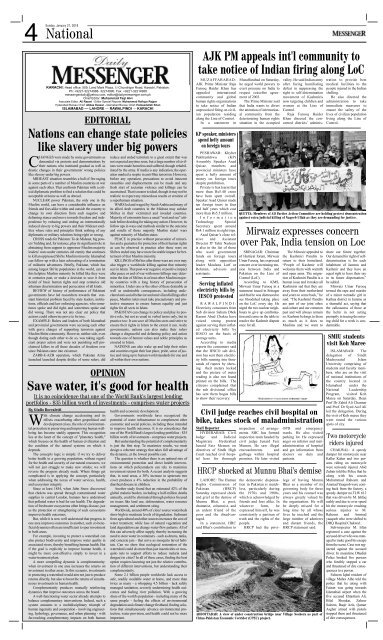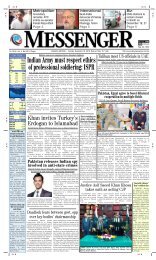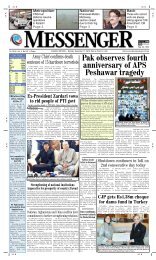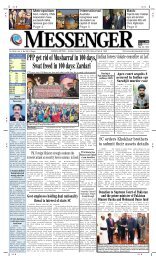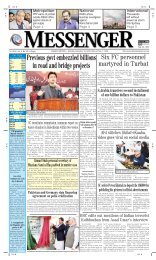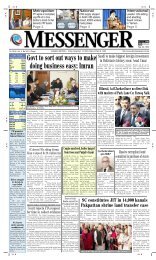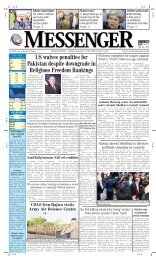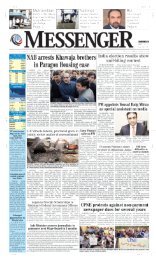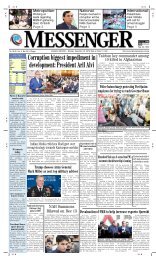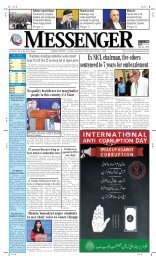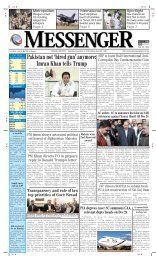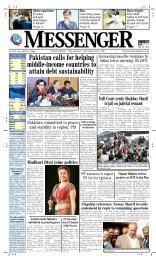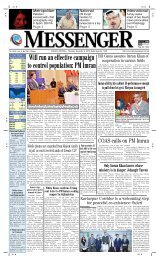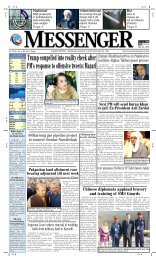Create successful ePaper yourself
Turn your PDF publications into a flip-book with our unique Google optimized e-Paper software.
4<br />
Sunday, <strong>Jan</strong>uary <strong>21</strong>, <strong>2018</strong><br />
National<br />
KARACHI: Head office: 509, Land Mark Plaza, I.I Chundrigar Road, Karachi, Pakistan.<br />
Ph: +92<strong>21</strong>-32<strong>21</strong>4988- 32<strong>21</strong>4990, Fax: +92<strong>21</strong>-32<strong>21</strong>4989<br />
messengerdaily@yahoo.com, editor@dailymessenger.com.pk<br />
Chief Editor: Muhammad Taqi Alvi<br />
Associate Editor: Ali Razavi - Editor Special Reports: Muhammad Rafique Rajpar<br />
Hyderabad Bureau Chief: Abbas Kassar - Islamabad Bureau Chief: Hameedullah Khan<br />
ISLAMABAD –– LAHORE –– RAWALPINDI –– KARACHI<br />
CHANGES were made by some governments as<br />
demanded via protests and demonstrations by<br />
their nations who instituted gradual as well as<br />
drastic changes in their governments' wrong policies<br />
like slavery under big powers.<br />
MIDEAST situation resembles a ball of fire raging<br />
in some parts of a number of Muslim countries at war<br />
against each other. That confronts Pakistan with a critical<br />
diplomatic problem to find a solution that could be<br />
acceptable at home as well as abroad.<br />
NUCLEAR power Pakistan, the only one in the<br />
Muslim world, can have a considerable influence on<br />
friends and foes alike within and outside the country to<br />
change its own direction from such negative and<br />
defaming stance and move towards freedom and independence<br />
by reducing and ending an internationally<br />
induced slavery to big powers and their Mideast satellites<br />
where rules and principles think nothing of any<br />
diplomatic or military solutions being right or wrong.<br />
CROSS roads for Pakistan: To do Mideast, big powers’<br />
bidding and, for instance, play its significant role in<br />
abstaining from support to oppressor Muslim majority<br />
leaders' wars under centuries old enmity that continues<br />
to kill an oppressed Shi'ite Muslim minority. Islamabad<br />
can follow up with a later advocating of a termination<br />
of militarist adventures. Briefly, Pakistan, which has<br />
among largest Shi'ite populations in the world, can let<br />
this helpless Muslim minority be killed like they were<br />
in centuries past, or make a decision to save it from<br />
denial of basic human rights and stop centuries old<br />
inhuman discrimination and persecution of all kinds.<br />
REVIEW of history of performance of Pakistani<br />
governments have led researchers towards that constant<br />
historical problem faced by state leaders, institutions,<br />
officials and law enforcing agencies, who sometimes<br />
spoke and did right, and sometimes spoke and<br />
did wrong. There was not any clear cut policy that<br />
actions could otherwise prove to be true.<br />
EXAMPLE: Rulers and leaders of both Islamabad<br />
and provincial governments were accusing each other<br />
with grave charges of supporting terrorism against<br />
Muslim Shiite community. However, neither side, even<br />
though daring each other to do so, was taking signficiant<br />
proper action and were not punishing self proclaimed<br />
killers in all those decades of freedom ever<br />
since Pakistan came into existence.<br />
ZARB-E-AZB operation, which Pakistan Army<br />
launched launched despite dislike of some rulers, did<br />
By, Giulio Boccaletti<br />
With climate change accelerating and its<br />
effects exacerbating other geopolitical and<br />
development crises, the role of environmental<br />
protection in preserving and improving human wellbeing<br />
has become starkly apparent. This recognition<br />
lies at the heart of the concept of "planetary health,"<br />
which focuses on the health of human civilization and<br />
the condition of the natural systems on which it<br />
depends.<br />
The concept's logic is simple: if we try to deliver<br />
better health to a growing population, without regard<br />
for the health and security of our natural resources, we<br />
will not just struggle to make new strides; we will<br />
reverse the progress already made. Where things get<br />
complicated is in applying the concept, particularly<br />
when addressing the nexus of water services, health,<br />
and ecosystem integrity.<br />
Since at least 1854, when John Snow discovered<br />
that cholera was spread through contaminated water<br />
supplies in central London, humans have understood<br />
that polluted water is bad for our health. The degradation<br />
of freshwater ecosystems often brings disease, just<br />
as the protection or strengthening of such ecosystems<br />
improves health outcomes.<br />
But, while it is now well understood that progress in<br />
one area improves outcomes in another, such co-beneficial<br />
dynamics often are insufficient to spur investment<br />
in both areas.<br />
For example, investing to protect a watershed can<br />
also protect biodiversity and improve water quality in<br />
associated rivers, thereby benefiting human health. But<br />
if the goal is explicitly to improve human health, it<br />
might be more cost-effective simply to invest in a<br />
water-treatment plant.<br />
A more compelling dynamic is complementarity:<br />
when investment in one area increases the returns on<br />
investment in other areas. In this scenario, investments<br />
in protecting a watershed would aim not just to produce<br />
returns directly, but also to boost the returns of simultaneous<br />
investments in human health.<br />
Complementarity produces mutually reinforcing<br />
dynamics that improve outcomes across the board.<br />
A well-functioning water sector already attempts to<br />
balance complementary interventions. Indeed, such a<br />
system amounts to a multidisciplinary triumph of<br />
human ingenuity and cooperation - involving engineering,<br />
hydrology, governance, and urban planning - with<br />
far-reaching complementary impacts on both human<br />
EDITORIAL<br />
Nations can change state policies<br />
like slavery under big powers<br />
OPINION<br />
reduce and ended terrorism to a great extent that was<br />
not expected anytime soon, but a large number of civilians<br />
were made homeless and suffered, though rehabilitated<br />
by the army. If media is any indication, the operation<br />
marked a respite in anti-Shia terrorism. However,<br />
before any operation, precautions to avoid innocent<br />
casualties and displacements can be made and any<br />
fresh start of sectarian violence and killings can be<br />
ascertained. That is nearer to ideal, though it may not be<br />
realistic to expect any miraculous results or creation of<br />
a superhuman situation.<br />
WARS led and waged by Saudi Arabia and many of<br />
its allied Arab countries in the Mideast may subdue<br />
Shi'ites in their victimized and invaded countries.<br />
Majority of extremists have a usual "wait and see" attitude<br />
before deciding for taking any action. However, its<br />
follow ups in ways and methods similar to the outcome<br />
and results of those majority Muslim states' wars<br />
against minority of Muslim states.<br />
PEACE in practice without persecution of minorities<br />
and a guarantee for protection of their human rights<br />
as can be observed in practice after those wars on<br />
Shi'ites ended may have more favorable impact for betterment<br />
of that Muslim minority.<br />
KILLINGS of Shi'ites after those wars are over may<br />
also trigger a worldwide killing against that minority<br />
sect in Islam. That post-war negative or positive impact<br />
after peace or end of war with more killings may determine<br />
the fate of Shi'ites in at least other Muslim majority<br />
countries with a long history of persecution of<br />
minorities. Under one or the other of these desirable as<br />
well as undesirable consequences, including undeclared<br />
anti-social behavior and uncivilized killings after<br />
peace, Muslim rulers must take precautionary and protective<br />
measures to ensure human equality and just<br />
rights for all sects in Islam.<br />
PAKISTAN can change its policy and play its positive<br />
role, but not as usual in verbal terms only, but in<br />
practice too: It can save all Muslim sects and strive to<br />
ensure their rights in Islam to the extent it can. Aside<br />
governments, nations can also make their rulers<br />
change a disgraceful and defaming policy and action<br />
towards one of human values and noble principles as<br />
ensured in Islam.<br />
NATIONS can also wake up and help their rulers<br />
and countries regain their lost place, pride, sense of justice<br />
and rising up to human world standards for one and<br />
all within their own nations.<br />
Save water, it's good for health<br />
It is no coincidence that one of the World Bank's largest lending<br />
portfolios - $35 billion worth of investments - comprises water projects<br />
health and economic development.<br />
Governments worldwide have recognized the<br />
potential of water infrastructure to complement other<br />
economic and social policies, including those intended<br />
to improve health outcomes. It is no coincidence that<br />
one of the World Bank's largest lending portfolios - $35<br />
billion worth of investments - comprises water projects.<br />
But understanding the potential of complementarity<br />
is just the first step. To maximize results, we must<br />
design a coherent strategy that takes full advantage of<br />
the dynamic, at the lowest possible cost.<br />
The question is whether there is an optimal mix of<br />
environmental protection and direct health interventions<br />
on which policymakers can rely to maximize<br />
investment returns for both. A recent analysis suggests<br />
that, in rural areas, a 30% increase in upstream tree<br />
cover produces a 4% reduction in the probability of<br />
diarrheal disease in children.<br />
Another study found that an estimated 42% of the<br />
global malaria burden, including a half-million deaths<br />
annually, could be eliminated through policies focused<br />
on issues like land use, deforestation, water resource<br />
management, and settlement siting.<br />
Worldwide, around 40% of cities' source watersheds<br />
show high to moderate levels of degradation. Sediment<br />
from agricultural and other sources increases the cost of<br />
water treatment, while loss of natural vegetation and<br />
land degradation can change water-flow patterns.All of<br />
this can adversely affect supply, thereby increasing the<br />
need to store water in containers - such as drums, tanks,<br />
and concrete jars - that serve as mosquito larval habitats.<br />
Can we show that ecological restoration of the<br />
watershed could do more than just insecticides or mosquito<br />
nets to support efforts to reduce malaria (and<br />
dengue) in cities? In all of these cases, finding the best<br />
option requires knowing not just the relative contribution<br />
of different interventions, but understanding their<br />
complementarity.<br />
Some 2.1 billion people worldwide lack access to<br />
safe, readily available water at home, and more than<br />
twice as many - a whopping 4.5 billion - lack safely<br />
managed sanitation, severely undermining health outcomes<br />
and fueling river pollution. With a growing<br />
share of the world's population - including many of the<br />
same people - feeling the effects of environmental<br />
degradation and climate change firsthand, finding solutions<br />
that simultaneously advance environmental protection,<br />
water provision, and health could not be more<br />
important.<br />
AJK PM appeals int'l community to<br />
take notice of Indian firing along LoC<br />
MUZAFFARABAD:<br />
AJK Prime Minister Raja<br />
Farooq Haider Khan has<br />
appealed international<br />
community and global<br />
human rights organizations<br />
to take notice of Indian<br />
unprovoked firing on civilian<br />
population residing<br />
along the Line of Control.<br />
In a statement in<br />
KP speaker, ministers<br />
spend hefty amount<br />
on foreign tours<br />
PESHAWAR: Khyber<br />
Pakhtunkhwa (KP)<br />
Assembly Speaker Asad<br />
Qaisar, members and<br />
provincial ministers have<br />
spent a hefty amount of<br />
money on foreign tours<br />
despite prohibition.<br />
Private tv has learnt that<br />
more than Rs5.40 crore<br />
have been spent overall.<br />
Speaker Asad Qaisar made<br />
ten foreign tours in four<br />
and half years which cost<br />
more than Rs5.5 million.<br />
I n f o r m a t i o n<br />
Technology Special<br />
Secretary spent around<br />
Rs4.1 million in eight trips.<br />
Asad Qaisar’s close relative<br />
and Assistant<br />
Director IT Tahir Nadeem<br />
is also in the list of those<br />
who used government<br />
funds on foreign tours<br />
along with opposition<br />
leader Maulana Lutf ur<br />
Rehman, advisors and<br />
assistants.<br />
Serving inflated<br />
electricity bills by<br />
IESCO protested<br />
R A W A L P I N D I :<br />
Electricity consumers from<br />
Sub division Saham Dhok<br />
Karam Abad Chakra have<br />
voiced strong protest<br />
against serving them inflated<br />
electricity bills by<br />
IESCO on the basis of<br />
average units.<br />
According to media<br />
reports the consumers said<br />
that the IESCO sub division<br />
has sent them electricity<br />
bills running into thousands<br />
of rupees by showing<br />
their meters locked<br />
and the picture of meter<br />
reading is also not found<br />
printed on the bills. The<br />
citizens complained that<br />
the sub divisional office<br />
has sent them bogus bills<br />
to show their recovery.<br />
Staff Reporter<br />
HYDERABAD: Civil<br />
Judge and Judicial<br />
Magistrate Hyderabad<br />
Junaid Faiz Memon on<br />
directives of Sindh High<br />
Court reached civil hospital<br />
here for thorough<br />
Muzaffarabad on Saturday,<br />
he urged world powers to<br />
exert pressure on India to<br />
respect ceasefire agreement<br />
of 2003.<br />
The Prime Minister said<br />
that India wants to divert<br />
the attention of international<br />
community from the<br />
deteriorating human rights<br />
situation in the occupied<br />
valley. He said Indian army<br />
after facing humiliating<br />
defeat in suppressing the<br />
right to self-determination<br />
movement of Kashmiris<br />
now targeting children and<br />
women at the Line of<br />
Control.<br />
Raja Farooq Haider<br />
Khan directed the concerned<br />
districts’ administration<br />
to provide best<br />
medical facilities to the<br />
people injured in the Indian<br />
shelling.<br />
He also directed the<br />
administration to take<br />
immediate measures to<br />
ensure the safety of the<br />
lives of civilian population<br />
living along the Line of<br />
Control.<br />
QUETTA: Members of All Parties Action Committee are holding protest demonstration<br />
against extra judicial killing of Naqeeb Ullah as they are demanding for justice.<br />
Mirwaiz expresses concern<br />
over Pak, India tension on Loc<br />
SRINAGAR: Chairman<br />
of Hurriyat forum, Mirwaiz<br />
Umar Farooq, has expressed<br />
concern over increasing tension<br />
between India and<br />
Pakistan on the Line of<br />
Control (LoC).<br />
According to KMS,<br />
Mirwaiz Umar Farooq in a<br />
statement issued in Srinagar<br />
said that he was distressed to<br />
see bloodshed taking place<br />
on the LoC every day. He<br />
urged the two nuclear neighbours<br />
to give up confrontation<br />
and come on the table to<br />
resolve the Kashmir dispute<br />
once for all.<br />
inspection of arrangements.<br />
SHC has formed<br />
inspection team headed by<br />
civil judge Junaid Faiz<br />
Memon. He saw illegal<br />
encroachments and<br />
garbage within hospital<br />
premises. He later visited<br />
The Mirwaiz appealed to<br />
the Kashmiri Pandits to<br />
return to their homeland.<br />
“People of Kashmir will<br />
welcome them with warmth<br />
and open arms. The migration<br />
of Kashmiri Pandits is a<br />
human issue and it makes all<br />
Kashmiris sad that they are<br />
away from their motherland<br />
and yearn to come back,” he<br />
said. “The Kashmiri Pandits<br />
are part of our joint ethos<br />
and culture and our common<br />
past and will always remain<br />
so. Kashmir belongs to them<br />
as much as it does to<br />
Muslims and we want to<br />
Civil judge reaches civil hospital on<br />
bike, takes stock of maladministration<br />
OPD and emergency<br />
wards. He also visited<br />
parking lot. He expressed<br />
anger on inferior and maladministration<br />
of hospital<br />
and got information from<br />
doctors on duty and<br />
patients.<br />
HRCP shocked at Munnu Bhai's demise<br />
LAHORE: The Human<br />
Rights Commission of<br />
Pakistan (HRCP)<br />
Saturday expressed shock<br />
and grief at the demise of<br />
Munnu Bhai, a poet,<br />
dramatist, columnist, and<br />
an ardent friend of the<br />
poor and the disadvantaged.<br />
In a statement, HRC<br />
said Bhai's contribution to<br />
the democratic dispensation<br />
in Pakistan is matchless,<br />
particularly during<br />
the 1970s and 1980s,<br />
which is acknowledged by<br />
friends and foes alike. In<br />
whatever form, he<br />
expressed himself, he was<br />
consistently a partisan of<br />
truth and the rights of the<br />
people.<br />
HRCP had the privilege<br />
of having Munnu<br />
Bhai as a member of its<br />
governing body for three<br />
years and his counsel was<br />
always greatly valued by<br />
the organization. He will<br />
be deeply missed for a<br />
long time by all whose<br />
lives he touched and the<br />
large number of admirers<br />
and distant friends, the<br />
HRCP statement said.<br />
ABBOTTABAD: A view of under construction bridge near Village Noshera as part of<br />
China-Pakistan Economic Corridor (CPEC) project.<br />
share our future together.<br />
Our demand for right of selfdetermination<br />
is for each<br />
inhabitant of Jammu and<br />
Kashmir and they have an<br />
equal right to have their say<br />
in its future dispensation,”<br />
he added.<br />
Mirwaiz Umar Farooq<br />
termed the rape and murder<br />
of a minor nomadic girl in<br />
Kathua district in Jammu as<br />
a shameful act, saying that<br />
the callousness of those at<br />
the helm in not acting<br />
promptly in tracing the missing<br />
child for a week is condemnable.<br />
SMIU students<br />
visit Koh Maree<br />
ISLAMABAD: The<br />
delegation of Sindh<br />
Madressatul Islam<br />
University comprising of<br />
students and faculty members,<br />
who are on the visit<br />
of national institutions of<br />
the country located in<br />
Islamabad under the<br />
National Leadership<br />
Program, visited Koh<br />
Maree on Saturday. Dean<br />
Prof Dr Zahid Ali Channar<br />
and Prof. Dr Syed Asif Ali<br />
led the delegation. During<br />
the visit of Koh maree they<br />
went round the various<br />
spots of city.<br />
Two motorcycle<br />
riders injured<br />
CHAKWAL: A speedy<br />
dumper hit motorcycle near<br />
Kallar Kahar and two persons<br />
riding on motorcycle<br />
were seriously injured. Abid<br />
Zubair told the Police that he<br />
along with his cousin<br />
Muhammad Raheem and<br />
Ammad Yaaqoob were coming<br />
back from the factory, a<br />
speedy dumper no.TLW 612<br />
that was driven by M. Ishfaq<br />
rashly and due to over speed<br />
hit the motorcycle resulting<br />
serious injuries to M.<br />
Raheem and Ammad<br />
yaaqoob who were shifted to<br />
DHQ Hospital Chakwal.<br />
Sub-inspector M. Irfan<br />
registered a case against the<br />
accused driver who was managed<br />
to make good his escape<br />
from the scene. Case was registered<br />
against the accused<br />
driver. In meantime Dhudial<br />
Police booked five persons<br />
who forcibly stopped a car<br />
and threatened of dire consequences<br />
to a person.<br />
Faheem Iqbal resident of<br />
village Mohra Alho told the<br />
police that he along with<br />
Faizan was going towards<br />
Islamabad airport when the<br />
five accused Ehtasham Ali,<br />
Bilal Shoukat, Zaheer<br />
Saleem, Baqir Aziz, Qamar<br />
Asghar armed with pistols<br />
stopped them and threatened<br />
of dire consequences.


